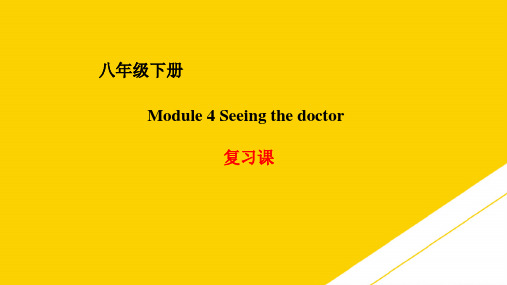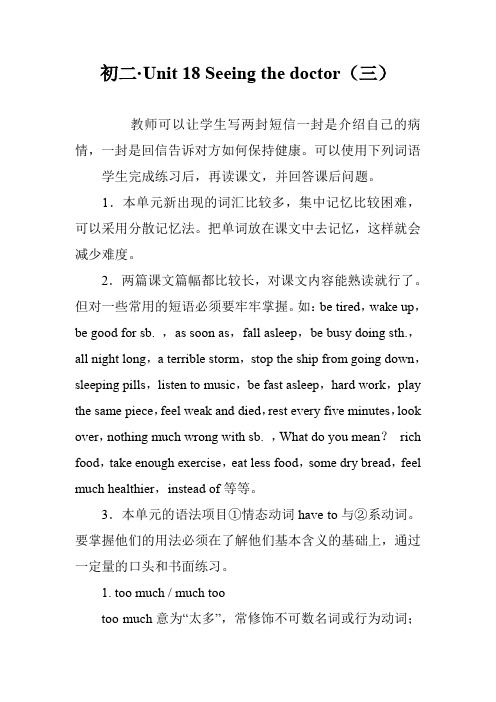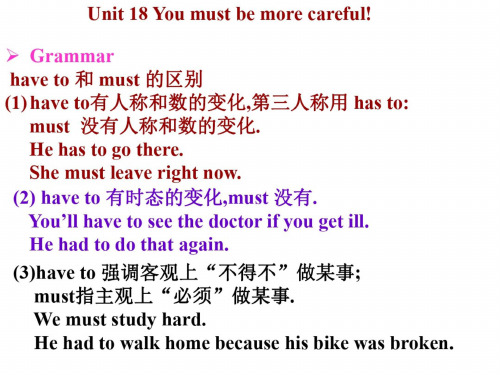八年级英语下学期unit-18-Seeing-the-doctor-lesson-70
- 格式:ppt
- 大小:630.50 KB
- 文档页数:31

外研版八年级下 M4 Seeing the doctor今天是一个不同寻常的日子,因为我去看了医生。
早上起来,我感觉身体有些不适,但并不知道具体发生了什么。
我决定去看医生,以确保自己的健康状况良好。
到达医院后,我首先在接待处报到了我的情况。
然后,我被引导到一个等待室里等待医生的召唤。
在等待的过程中,我感到有些紧张和不安,但我尽力保持冷静,并尝试让自己平静下来。
最终,我听到医生叫我进入他的办公室。
他是一个非常友好和专业的医生,这让我感到有些安慰。
我告诉他我的症状,他开始问我一些问题,并进行了身体检查。
经过检查,医生告诉我我的病情是轻微的流感。
他建议我多喝水,多休息,并给我开了一些药来缓解我的症状。
听到这个消息后,我感到有些安心,因为我知道我只是需要一些休息和药物来恢复健康。
在离开医院之前,我向医生表示了感谢,并感谢他的帮助和建议。
我认为这次看医生是一次非常有价值的经历,让我更加了解自己的身体状况,并学习如何照顾自己。
我认为这次看医生是一次积极的经历。
虽然我感到有些紧张和不安,但医生的专业知识和建议让我感到安心。
我希望我能继续保持健康,并为自己负责。
外研版八年级下M9的主题是“友谊”,这个主题让我们对友谊有了更深入的思考。
友谊是生命中最宝贵的财富之一,它能在我们最需要的时候给予我们力量和帮助。
在我们的生活中,有很多种关系,但是友谊是最为特殊的一种。
朋友之间可以互相分享快乐和悲伤,一起经历生活的各种挑战和困难。
他们会在我们需要的时候伸出援手,支持我们,陪伴我们度过难关。
友谊不仅仅是在学校里建立的,它也可以在各种场合中建立。
我们可以和朋友一起学习、玩耍、聊天、分享生活经验。
我们可以从朋友那里学到很多东西,获得新的观点和想法。
同时,我们也可以为朋友提供支持和鼓励,帮助他们克服困难和挑战。
友谊的力量在于它能让我们感到被接纳和理解。
当我们感到孤独或失落时,朋友会给我们安慰和支持。
他们不会嘲笑我们的缺点或弱点,相反,他们会鼓励我们克服它们,变得更好。



Unit 18 Seeing the doctor教材分析本单元的核心教学项目是“看病就医”(Seeing the doctor ),各课围绕这核心项目设计安排了听、说、读、写活动。
对话,课文及练习内容均取自于学生的日常生活,实用性强。
学生们会因为此话题的趣味性及实用性而感兴趣, 故能在学中用,用中学,印象深刻。
Lesson 69Teaching Objectives: Let the students understand “have to” and grasp how to use it. Learn some useful phrases and structures.Language Focus: What’s the trouble? What’s the matter with you? have a headache, take one’s temperature, nothing serious, take this medicine three times a day, feel like eating, have( got) a pain in one’s headProperties: Recorder, Overhead projectorTeaching Procedures:I .Organizing the classT: Ask the students to get ready for the class.Greetings and a duty report.II. Revision1. Get the students to act out the passage in Lesson 68.2. A quiz for them:(l)have a good time (2)at the head of (3)in fact (4)look after (5)get on (6)stand in line (7)quarrel with (8) invite. . . to. . . (9) make a noise (10) laugh at (11) not. . . until (12)make friends (13)throw about (14)get off (15)feel well (16)complainabout (17)at the end of (18) give the message to sb. (19) grow up (20) telephone sb.III. Leading-inT: When you feel bad or sick, you had better go to the hospital, arid doctors will help you.Then the doctor will ask you some questions about illness and let you take your temperature, at last ask you to take some medicine if your illness is not too serious.IV. PresentationT: Jill didn’t feel very well. She began to cough. Her mother asked her what was the matter. She told her mother she had a headache and a cough. Her mother could see how terrible the cough was. So she took her daughter to see a doctor at once. (可把图书画出来) T: Look at the picture. Try to guess what they are talking about.V. Practice1. Listening: Listen to the tape and try to understand it.2. Reading: Read the dialogue after the tape, then read together. Try to memorize it.3. Practising: Work in pairs.4. Acting: Ask some pairs to come to the front and act it out.VI. Teaching dialogueVII. Teaching Language Points1. What’s the trouble? = What’s the matter( with sb. ) ?= What’s wrong? 怎么了?有什么不对?有什么不舒服的?2. have a headache 头痛3. take one’s temperature 量体温4. nothing serious 没什么严重的everything, nothing, anything and something(1)I have something important to tell you.(2) Do you have anything interesting to do tonight?(3) If you work hard, you’ll find nothing difficult to do.(4) When he came back home, he discovered everything tidy in the room.5. take this medicine 吃这种药,服药6. three times a day一天三次(once 一次;twice 二次)7. feel like eating 想吃, feel like 想要、愿意8. have( got) a pain in one’s head 头痛VII. Learning grammarT:“have to”意为“不得不”,表示客观上“必须”,“must”指主观上“必须”。

初二·Unit 18 Seeing the doctor(三)教师可以让学生写两封短信一封是介绍自己的病情,一封是回信告诉对方如何保持健康。
可以使用下列词语学生完成练习后,再读课文,并回答课后问题。
1.本单元新出现的词汇比较多,集中记忆比较困难,可以采用分散记忆法。
把单词放在课文中去记忆,这样就会减少难度。
2.两篇课文篇幅都比较长,对课文内容能熟读就行了。
但对一些常用的短语必须要牢牢掌握。
如:be tired,wake up,be good for sb. ,as soon as,fall asleep,be busy doing sth.,all night long,a terrible storm,stop the ship from going down,sleeping pills,listen to music,be fast asleep,hard work,play the same piece,feel weak and died,rest every five minutes,look over,nothing much wrong with sb. ,What do you mean?rich food,take enough exercise,eat less food,some dry bread,feel much healthier,instead of等等。
3.本单元的语法项目①情态动词have to与②系动词。
要掌握他们的用法必须在了解他们基本含义的基础上,通过一定量的口头和书面练习。
1. too much / much tootoo much意为“太多”,常修饰不可数名词或行为动词;而much too意为“太”,常修饰形容词或副词,以加强语气。
如:He always eats too much meat,so he is much too fat. 他总是吃太多的肉,因此他太胖了。

unit18 Seeing the doctor听力部分(共三大题,30分)一、听句子,选择恰当的应答语。
(10分)()1.A.Because I went to bed too late last night.B.Because I’ll have a lot of work to do .C.Because I don’t look very well today.()2.A.I’m looking for a coat for my daughter .B.I’m here to meet my friends .C.I feel very weak.()3.A.OK , I won’t ,doctor.B.It doesn’t matter ,doctor.C.Thanks ,doctor.()4.A.Yes ,he did .B.No ,he doesn’t .C.He always dreams a lot .()5.A.It’s very dear .B.It’s very interesting.C.It’s mine.二、听对话及问题,选择最佳答案。
(10分)()6.A.He told her to eat less. B.He told her to eat more.C.He told her to do more exercise. D.Both B and C()7.A.She didn’t want to meet Becky .B.She had to take care of her sister.C.She wanted to drive David’s new car.D.She didn’t like Becky at all.()8.A.He’s a teacher.B.He’s a postman.C.He’s a doctor.D.He’s a policeman.()9.A.She has seen it before. B.She doesn’t want to see it .C.She didn’t get a ticket for it .D.She is ill and has to see a doctor. ()10.A.She is ill. B.She feels very tired.C.She often feels hungry. D.She often feels unhappy.三、听一段完整的对话,根据其内容选择最佳答案。
Unit 1 Helping those in needVoluntary worksome voluntary work during the offered to doThree teenagers the following reports.wroteschool holidays. TheyThe children I did some voluntary work in a children's hospital .painting we illnesses. organized a there all suffer from seriouscompetition for them.I meet a girl called Cindy .She wanted to paint a picture of the park near her home. I went there and took some photos of it. CindyBettyused them for her painting.met some of these There are many children without parents .I helps tell stories .This my with mother .we taught them to childrendon't ,”My friends feelings. One child said them express their understand my pain.time with a girl called Vivien. Her parents died in a car spendWeaccident, and she is unhappy and very lonely. Sheneeds friendship.MarkMy mother and I will continue to visit Vivien.I want to help disabled children. They have difficulty walking or moving. I taught them to sing because music can bring them joy andpeace.I met a boy called Tim. He hurt his legs in an accident ,but he hastheir and raise like We need to help children Tim lots of courage.Anniespirits . I will continue to do voluntary work in the future.译文:三名青少年在学校放假期间主动做一些志愿工作。
初二英语Unit 18 Seeing the doctor人教朗文版【本讲教育信息】一. 教学内容:Unit 18 Seeing the doctor二. 重点、难点1. have to 与must 用法区别2. 连系动词look, taste ,sound , feel3. Useful expression and phrases三. 具体内容1.have to 与must 用法区别:(1)联系:二者都含有“必须,不得不”的意思,都是情态动词。
(2)区别:①have to通常指由于客观原因而不得不做某事,意思为“不得不”。
It’s dark now. I have to go home.天黑了,我不得不回家。
It’s raining, and I have to stay at home.外面在下雨,我不得不呆在家里。
②must 通常指出于个人的主观愿望而必须做某事,意思为“必须”。
This year I must study hard. 今年我必须认真学习。
I must do my homework every day. 每天我必须做作业。
2. 连系动词:look, taste ,sound , feel(1)目前我们学过的系动词有:taste, feel, sound, look, seem, smell, get ,bee, turn, be.(2)系动词通常用于主+系+表结构中,它们后面通常接形容词作表语。
eg.The song sounds beautiful这首歌听起来很好听。
The flower smells good. 这朵花闻起来很香。
Her mother looks young. 她的妈妈看起来很年轻。
It gets warmer. 天气变暖和了。
The song became very popular. 这首歌变得很流行(受人欢迎)。
3. 询问“某人哪不舒服”“某人怎么了? ”可以说:What’s the matter(with sb.)?What’s the trouble(with sb.)?What’s wrong(with sb.)?What’s your trouble?What has happened to you?(Is there)anything wrong with you?4. 评论某人的身体情况时一般说:There’s something wrong with him.Something must be wrong with him.There’s nothing serious with him.He has fallen ill and is in bed/hospital now.He has been ill for quite a few days.He has been in bed/hospital for a week.He is a little/much better now.He is even worse than before.He is getting well/better.He is felling well/better now.5. 询问某人的身体情况时可以说:How are you feeling now?Are you better?How are you(now)?How’s your mother?Is she any better now?How long have you been like this?How long has she been in bed/in hospital?6. This morning I had a pain in my head. 今天早上我头部疼。